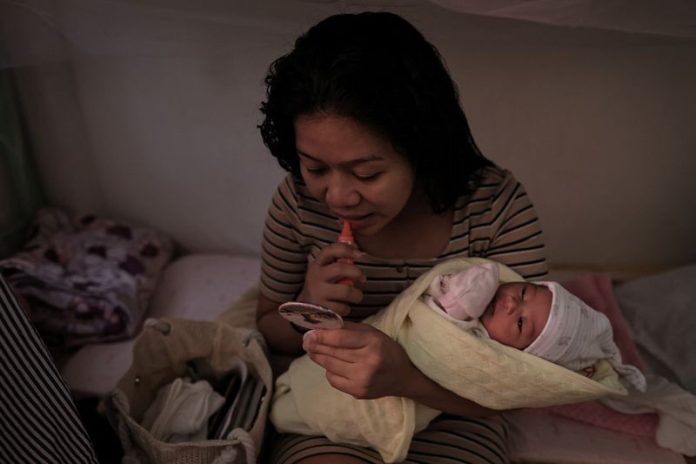By Ann Wang
IROSIN, Philippines/NEW TAIPEI, Taiwan (Reuters) -Marian Duhapa kisses her quietly sleeping baby daughter Quinn goodbye as she prepares for the 16-hour bus trip from her remote village in the Philippines to Manila airport before flying back to Taiwan and work.
“I pray for myself, the baby and my family. I pray I can find a job so I can help my daughter and my family. This is my only choice now,” said Duhapa.
For hundreds of thousands of migrant workers like 32-year-old Duhapa, moving overseas to work is a painful decision. While a job abroad will give them enough money to support their families, they will also have to leave their children, often for years at a time. If they stay at home, however, they may struggle to get by.
“Life in the Philippines is so difficult. Every move you make requires money. It’s poverty. Even if you earn, it’s still not enough,” said Duhapa, who is the main breadwinner for her extended family of 11.
Tech powerhouse Taiwan, whose capital Taipei is only a two-hour flight from Manila, is home to more than 150,000 Filipino migrant workers.
They mostly work in factories and as domestic helpers, caring for the young and the elderly, taking on jobs many Taiwanese do not want to do on an island with a declining birth rate.
Around two million Filipinos, more than half of them women, work overseas, according to the Philippines government.
For some, Taiwan is a better choice than the Middle East where rights groups say many are mistreated.
But campaigners say Taiwan must also improve protections for migrant workers, and grant them rights such as being able to bring family members with them.
Duhapa lost her job when she became pregnant and lived in a shelter in Taiwan until she gave birth.
“They treat migrant workers as second-class people, who aren’t entitled to basic human rights. This is utterly inhumane,” said Lennon Wang from the Taiwan migrant worker group Serve the People Association.
“Taiwan fundamentally fails to recognise migrant workers as being fully human beings,” he added.
Taiwan Labour Ministry official Su Yu-kuo said earlier this year the government issued guidelines to protect the rights of female migrant workers and their children, underscoring government concern about the issue.
“Under the current legal framework, we ensure equal treatment – what we call national treatment,” Su said.
“Some workers may choose, after discussion with their families, to return home to give birth or raise their children,” he added.
“This is understandable because the environment for childbirth and parenting in Taiwan differs from that of their home countries – especially due to language and cultural differences. Ultimately, such decisions are deeply personal and made together with family.”
Most of the Filipinos who work overseas head to the Middle East. Duhapa’s eldest sister, Loriza, worked as a domestic helper in Dubai for seven years, but said conditions were hard with little time for rest, and she ultimately decided to return to her home in the Philippines.
“What I missed most in Dubai was my family – and the ability to rest. It was so hard. Every day, I worked with no break. I cooked, cleaned, and repeated it daily. Now, I can rest. I have peace of mind,” she said.
The family home in Irosin, on the far southeastern tip of Luzon island, is surrounded by rice fields and volcanoes and prone to typhoons.
Unlike many other houses in the village it is built of concrete rather than straw and there are plans to add a kitchen and bathroom, thanks to the money Marian sends home. She earns around $900 a month, triple what she could get in the Philippines. The sisters’ parents are subsistence farmers.
Marian says it is hard being separated from her daughter, but it is crucial for her future, even if it may be several years before she can see her again given the cost of travel.
“I was crying. My mother told me, ‘Your daughter will be okay. She will forgive you.’ But I said no. No, she won’t forgive me. My heart was so heavy. I wanted to go back. But I kept thinking: this is for my baby. This is for my family. I want to help them live a smoother life.”
(Reporting by Ann Wang; Writing by Ben Blanchard; Editing by Kate Mayberry)
Disclaimer: This report is auto generated from the Reuters news service. ThePrint holds no responsibility for its content.






